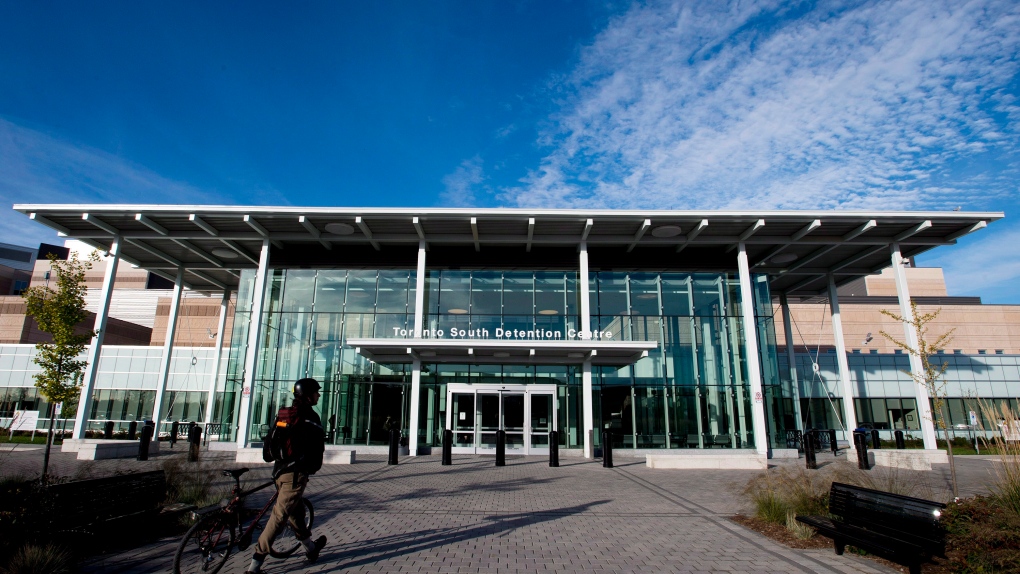‘Deplorable’ conditions see sentences lowered at Toronto South Detention Centre: court
A growing number of judges presiding over Ontario’s criminal cases are condemning “deplorable” jail conditions at the Toronto South Detention Centre (TSDC), where sentences continue to be shortened over inhumane conditions.
In considering a bail decision issued last week, Justice Brock Jones wrote that near-constant lockdowns and confinement are contributing to a “deplorable state of affairs” at the facility, which holds inmates awaiting trial or who have been sentenced to less than two years.
“Those who suffer the greatest are often our most vulnerable citizens – the poor, socially disadvantaged, those with mental health challenges, Indigenous Canadians, and racialized Canadians,” Jones wrote in his decision, which saw a man charged with eight possession charges granted a conditional release on bail.
According to data obtained by CTV News Toronto, the vast majority – more than 80 per cent – of inmates in provincially-run jails like TSDC are awaiting trial and presumed innocent. Most of these facilities were also operating overcapacity in 2023 — as of September, there was an average of 8,889 people in provincial custody, well over the 7,848-person capacity.
“It long ago reached a crisis level. Something must change. And it must begin to change now,” Jones wrote.
Jones’ commentary joins a growing number of judicial decisions, in which an accused’s time served has been reduced due to inhumane conditions at TSDC. Last year, records show at least 24 inmates have had their custodial periods shortened because of repeated lockdowns, pest infestations and other harsh treatment at the Etobicoke, Ont. facility.
When reached for comment, the Ministry of the Solicitor General did not respond by the publication deadline. It has previously said that $500 million has been earmarked to modernize the institution and hire more staff.
 The Toronto South Detention Centre in Toronto is shown on Thursday, Oct. 3, 2013. The facility is slated to open this fall. THE CANADIAN PRESS/Nathan Denette
The Toronto South Detention Centre in Toronto is shown on Thursday, Oct. 3, 2013. The facility is slated to open this fall. THE CANADIAN PRESS/Nathan Denette
In a decision from March, Superior Court Justice Anne Malloy wrote that lockdowns typically makeup at least 50 per cent of total days in custody for TSDC inmates.
During these lockdowns, inmates are held for hours, “sometimes days,” in windowless cells. They are restricted from rehabilitation programs, religious observance, showers, cleaning products, laundry, visits and telephone calls with loved ones, fresh air, and meetings and telephone calls with their lawyer until the lockdown is lifted, she wrote.
In her decision, Molloy called the circumstances “inhumane,” pointing to a recent report by the Ontario Human Rights Commission on the conditions at TSDC. The report, authored in 2020 after two walkthroughs of the facility, found in part that inmates were subject to confinement, infrequent changes of bedding and clothes, outbreaks of diseases such as scabies, and undue stress caused by repeated lockdowns.
According to Molloy, many of those issues are still routine four years later.
“If the Canadian public heard that one of our citizens was being held in similar conditions in a foreign prison, especially while presumed innocent of any charges against them, they would be outraged, as they should be,” Molloy said.
“I adopt the various descriptions my colleagues [Justice Andras Schreck] have used to describe the situation: It is, to use their words, unacceptable, shocking, deplorable, harsh, oppressive, degrading, disheartening, appalling, Dickensian, regressive and inexcusable,” she continued.
In that case, conditions at TSDC saw the sentence of a man convicted on drug trafficking and possession charges reduced by a year.
The Ontario New Democratic Party’s Justice Critic, Kristyn Wong-Tam, said in an interview with CTV News in January that the jail is among several parts of Ontario’s justice system failing to function thanks to underfunding and staff shortages.
“Overcrowding in the detention centres leads to more conflict, disease, sickness, and burnout with respect to the staff who are already overworked,” they said. “When you don’t have staff, they’re forced to lock these individuals in the cells and the conditions are not human. A judge has to consider all that. And they don’t get to sentence the individuals properly.”
The provincial government has not provided information on staffing levels at TSDC, but said earlier this year that TSDC has seen more than 430 new correctional officers deployed since the summer.
The problem, according to critics, lies in an “excessive” use of pre-trial detention caused by staff shortages.
“Even if pre-trial detention conditions were rendered more humane, the decision to deprive someone of their liberty before they have had a trial and the Crown has proven its case should be made sparingly,” the judge wrote. “Given the utterly dehumanizing conditions at the TSDC, it must be made even rarer until those conditions improve.”
Ontario’s judges cannot change these conditions, Brock wrote in his decision, but must “consider them when making decisions that affect the lives of those who come before [them].”
“They deserve to have their fundamental human rights respected,” he wrote.
With files from Jon Woodward and The Canadian Press.
View original article here Source









